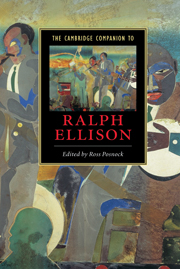Book contents
- Frontmatter
- Introduction
- 1 Ralph Ellison’s invented life
- 2 Ellison and the black Church
- 3 Ellison, photography, and the origins of invisibility
- 4 Ralph Ellison’s music lessons
- 5 Ralph Ellison’s constitutional faith
- 6 Ralph Ellison and the politics of melancholia
- 7 Invisible Ellison
- 8 Ellison’s experimental attitude and the technologies of illumination
- 9 Female iconography in Invisible Man
- 10 Chaos not quite controlled
- 11 Ralph Ellison, Hannah Arendt, and the meaning of politics
- 12 Dry bones
- Selected bibliography and suggestions for further reading
- Index
- Series List
1 - Ralph Ellison’s invented life
a meeting with the ancestors
Published online by Cambridge University Press: 28 May 2006
- Frontmatter
- Introduction
- 1 Ralph Ellison’s invented life
- 2 Ellison and the black Church
- 3 Ellison, photography, and the origins of invisibility
- 4 Ralph Ellison’s music lessons
- 5 Ralph Ellison’s constitutional faith
- 6 Ralph Ellison and the politics of melancholia
- 7 Invisible Ellison
- 8 Ellison’s experimental attitude and the technologies of illumination
- 9 Female iconography in Invisible Man
- 10 Chaos not quite controlled
- 11 Ralph Ellison, Hannah Arendt, and the meaning of politics
- 12 Dry bones
- Selected bibliography and suggestions for further reading
- Index
- Series List
Summary
Jerry Watts's 1994 book Heroism and the Black Intellectual was the first to treat at length throughout the contradictions of Ralph Ellison's cultural and political position. Watts saw Ellison's hesitation to support vigorously the 1960s struggle for racial and social justice in America as a kind of truancy, an abandonment of an earlier principle. In Watts's view, Ellison endorsed a fairly conservative idea called black exceptionalism – the hero's triumph against the odds – as a means of outwitting the peril of racism. In order to strengthen his claim that Ellison became isolated from the civil rights movement and even broader shifts in American society, Watts offered a critique of Ellison's psychological make-up, picking up the controversy over Ellison's career where it had been left in the early 1970s, when Ellison faced boos when he ventured to make a speech.
As a heroic individualist, Ellison appears to be tormented by his ambitions. The Achilles’ heel of heroic individualism is unrealistic, almost obsessive-compulsive, artistic ambition. In such a mental state, one not only strives for perfection but also perceives anything less as defeat or weakness. Certainly, there is something tragically obsessive-compulsive about Ellison spending forty years writing a second novel.
- Type
- Chapter
- Information
- The Cambridge Companion to Ralph Ellison , pp. 11 - 34Publisher: Cambridge University PressPrint publication year: 2005
- 11
- Cited by



